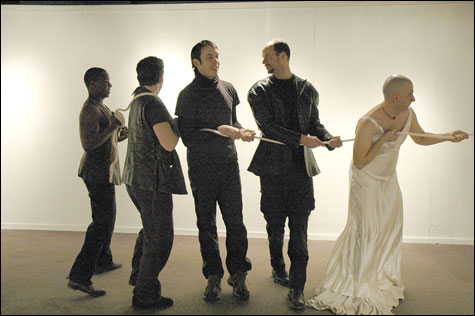
John Kuntz and the Goths
|
It’s hardly Shakespeare’s most frequently produced work, but in the Bard’s early career, Titus Andronicus was one of his most popular plays. Chalk that up to the same plot elements that draw crowds to everything from mobster blockbusters to sci-fi slaughter fests — vengeance, gore, fatal jealousy, twisted families.
“Elizabethans loved a gory revenge tragedy,” says David R. Gammons, who’s directing the show for Actors’ Shakespeare Project. “There’s an unease among scholars [toward Titus]. They’re leery of the feeling that it’s a popular piece as opposed to profound. Like horror movies and soap operas, it appeals to our baser instincts in wonderful ways. It forces us to confront the dark places our psyches go. It allows us an opportunity to think about grief and how we grieve. Its violence grows out of grieving.”
Although Titus seems like a bloodbath, it’s the recurring imagery of tears that strikes Gammons — especially given that Tamora is a woman and it’s the men who shed most of the tears. The Queen of the Goths (who are vanquished by the Romans) is so brutal — not least in encouraging rape — that some women in the company were uncomfortable about playing the role. So evolved the idea to stage the play with an all-male cast.
Such casting was, as everybody who’s seen Shakespeare in Love knows, de rigueur in Shakespeare’s time. But these days, all-male casts often signal an element of camp. For Gammons, staging the production as it would have been done in 1590s London helped him and the company better understand their roles as contemporary theater makers. But the troupe has been confronted with the intricacies of gender politics, which are more complex now than then.
“We want to play the truth of femininity of the [female] characters,” he says. “It’s not fake boobs and wigs, but we had to differentiate men from women. We asked: what if we determine another vocabulary for ways in which men differentiated from women visually? I imagined them an inversion: what if, in world of Titus, men have hair and women don’t? It became an idea how to make it clear off the bat how this body is different from that.”
So Boston playwright and actor John Kuntz, the ASP member who plays Tamora, shaved his head. “It’s not really about trying to look female,” he explains. “It’s just a masculine world where even women are masculine. The Tamora we came up with probably leads the army; in the battlefield she kills people with her bare hands. She’s vicious. It feels fresh and modern. We’re different from Shakespeare’s time. Gender and sexual politics are different games. I’ve come to think of traditional as women playing females. Even though all-male was the way it was done way back, it’s become the opposite of traditional. It seems like a fresh idea now.”
Titus Andronicus | Actors’ Shakespeare Project | Basement at the Garage, Garage Mall, 38 JFK St, Cambridge | March 29–April 22 | $33-$40; $15 student rush | 866.811.4111
On the Web
Actors’ Shakespeare Project:www.actorsshakespeareproject.org